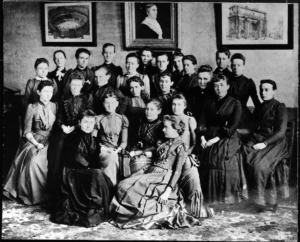
MIT Association of Women Students, 1893. Image from the Women@MIT Project file. Courtesy MIT Museum.
Spring 2023 marks the 150th anniversary of the first woman to graduate from MIT. Ellen Henrietta Swallow Richards was a chemist and geologist whose work on the contamination of water and food led to the development of health and safety standards, and the fields of Home Economics and Sanitation. She was also an advocate for equal education for women, raising money with the Women’s Education Association to fund a chemistry laboratory at MIT that was equipped with bathrooms for women. The Woman’s Laboratory at MIT ran from 1876 to1883, when a new, more modern chemistry laboratory was built, and students could work side by side in the lab regardless of gender.
MIT Libraries’ Department of Distinctive Collections is pleased to be able to offer digital access to our collections recording the experiences of some early women students at the Institute. The collections were digitized as part of the Women@MIT Archival Initiative, which strives to add to the historic record by collecting, preserving, and sharing the lives and works of women affiliated with MIT. Digitized materials can be accessed on MIT’s digital collections portal at dome.mit.edu. Included in the project were the Collection on Ellen Swallow Richards (MC-0659), the Collection on the Massachusetts Institute of Technology Woman’s Laboratory (AC-0298), and records from the Association of MIT Alumnae (MC-0065) including almost 300 responses to the 1906 and 1916 surveys of women who had attended MIT.
The surveys of past students provide, in the students’ own words, information on their studies, their experience of MIT as women, and their lives after leaving school. Survey respondents include Katharine Dexter McCormick, who funded McCormick Hall; Marie Celeste Turner, thought to be the first Black woman to attend MIT and paleontologist Elvira Wood, who later worked as an assistant curator at the American Museum of Natural History; as well as architects, physicians, and teachers including Kiyo Makino, an exchange student from Japan. Many other respondents report that they became full-time wives and mothers, putting their scientific knowledge to use running safer households in an era when sanitation and food safety were still newly hatched ideas.
These materials offer valuable insight into the lives of women students in the late 1800s and early 1900s, as well as providing documentation on one of the earliest chemical laboratories open to women students in the United States.

